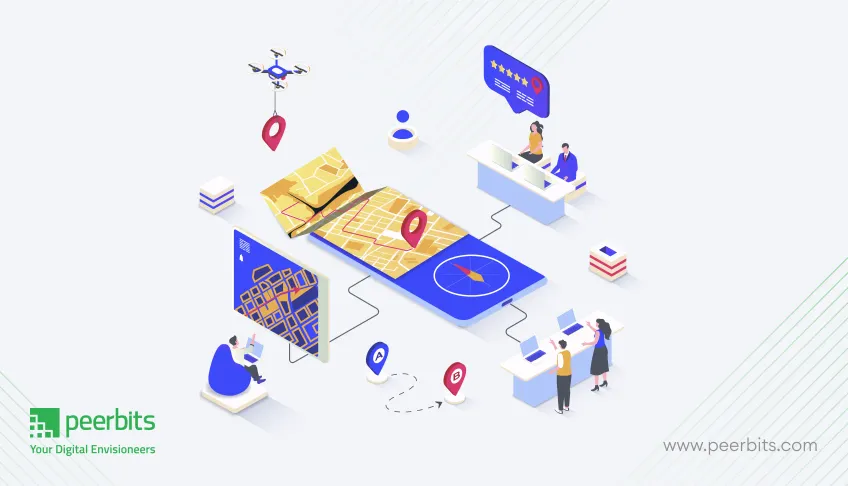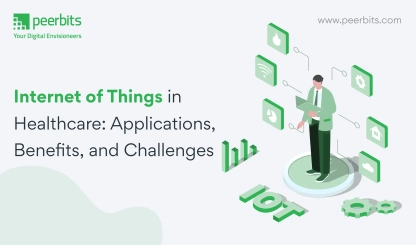Efficient fleet management has become a necessity for businesses aiming to stay competitive. GPS vehicle tracking offers more than just real-time location updates; it’s a powerful tool that cuts costs, enhances safety, and drives operational efficiency.
From optimizing routes to improving driver accountability, this technology benefits every aspect of fleet management. For businesses, it means saving money, meeting deadlines, and boosting customer satisfaction.
According to data from Jimi IoT, the global fleet management market is projected to reach $33.9 billion by 2026. This growth highlights the increasing demand for efficient vehicle tracking and operational optimization solutions across industries.
To fully understand the potential of this technology in logistics app development, you should be aware of the term vehicle telematics; it combines GPS tracking, real-time data, and sensors to monitor vehicle performance, location, and driver behavior.
This data helps optimize routes, reduce costs, and improve safety, offering businesses valuable insights for better fleet management and operational efficiency. Still, if you are wondering what role GPS plays in it, follow along!
Role of GPS in modern vehicle telematics
Telematics collects data from vehicles and turns it into helpful insights for better decision-making.
Over time, vehicle telematics have evolved to include cellular modems, GPS, backup batteries, and sensor connections, creating a more digitalized telematics system.
This system not only enhances vehicle safety but also helps with GPS navigation, provides roadside assistance, avoids traffic, auto-dials emergency services, and optimizes EV charging times.
A critical element of vehicle telematics is the GPS fleet tracking & management system. It not only ensures consistent tracking of fleets but also brings scalability to businesses of all sizes.
Fleet management & GPS tracking are often considered as same by many. Some get confused about such discussions too. Worry not, just follow a detailed difference between GPS tracking and fleet management to get more clearer picture.
GPS tracking vs. fleet management: What’s the difference?
GPS tracking and fleet management may seem similar, but they serve distinct purposes within logistics and operations. GPS tracking focuses on the real-time location and movement of individual assets.
Fleet management covers a broader scope, focusing on the efficiency, safety, and overall performance of the entire fleet.
This table highlights the core differences to help you understand how each system can benefit your business uniquely.
| Feature | GPS tracking | Fleet management |
|---|---|---|
| Primary function | Tracks real-time location of assets | Manages and optimizes entire fleet operations |
| Core focus | Location tracking | Efficiency, safety, and performance |
| Data provided | Location, speed, route | Vehicle health, driver behaviour, fuel usage |
| User | Suited for individual asset tracking | Suited for managing multiple vehicles |
| Alerts | Basic alerts (ex- geofencing) | Advanced alerts (ex- maintenance reminders) |
| Analytics | Limited historical data | Detailed reports and insights |
How GPS systems boost safety & business growth?
GPS for tracker fleet management systems utilizes telematics from each vehicle of the fleet to improve driver safety by monitoring speeding, hard braking, and other risky driving habits.
These systems also contribute to environmental goals by reducing greenhouse gas emissions, and helping businesses meet sustainability targets.
GPS tracking improves route efficiency, ensuring drivers are directed along the most effective paths, which boosts customer service and on-time deliveries.
The system lets businesses increase revenues by taking on more work without the need to add more drivers or vehicles.
Implementing GPS for fleet management provides a competitive advantage by improving overall fleet efficiency, leading to cost savings and enhanced performance.

Telematics that form the smart fleet management system of today has evolved to include engine diagnostic tools (OBD), GPS, IoT devices and sensors, cloud storage and computing, and 4th generation data networks.
To optimize fleet management, it's important to learn how various tracking and data analysis technologies, such as GPS, IoT, and OBD systems, can provide valuable insights into vehicle and asset performance.
GPS tracking has given birth to many applications. One of the prominent applications is real-time vehicle tracking, which is made possible through advanced GPS tracking software.
1. Real-time vehicle tracking using GPS
An onboard GPS unit, attached to a compatible adapter under the driver’s seat, tracks location-based information. Field service management platforms enhance real-time tracking by connecting vehicle movement with job schedules, technician routing, and automated customer updates.
This includes the vehicle’s geometrical coordinates, speed, and other performance metrics.The data is monitored around the clock and sent to the cloud through a high-speed data connection.
Any person who has access to that cloud can watch the real-time movement of the vehicles on a map with the help of a mobile or web app, regardless of the screen in front of him.
The mobile app can also send push notifications for vehicle and performance alerts. For example, an over-speeding driver can be difficult to spot on a large map, but with an instant alert, you'll be notified right away.
2. Asset tracking with GPS and IoT devices
For logistics businesses, tracking a vehicle’s location is as important as tracking the assets it carries.
Through fleet management using GPS and IoT devices, logistics companies can track assets in real time. These sensors are installed on both fixed and mobile assets, such as trailers, generators, and other large equipment.
This lets companies monitor their assets in the field or on the road, much like how fleet companies track their vehicles in real-time.
3. Performance tracking with OBD and GPS units
On-board diagnostics monitors fuel usage, emissions, and other engine and vehicle performance metrics and reports them in real-time along with the everyday data GPS units.
If trucks in a fleet are consuming more on route B, the fleet operator will learn about it and reroute the trucks on route A rather, thus saving on fuel costs. It can tell a rowdy driver from a decent driver.
4. Data reporting and analytics
In addition to the data fed in real-time to enable GPS fleet, performance, and asset tracking system, lots of data is stored both locally in the vehicles and in the cloud storage.
While some may dismiss the data, organizing it in a tabulated format can offer valuable insights into fleet operations.
With mobile app development integrated into analytics software, data can be transformed into interactive graphs, showing key trends, such as fuel consumption comparisons between months.
How Big data helps in optimizing fleet management?
Over some time, the raw presumed useless data from vehicles’ telematics will easily tend to 100s of TBs in volume, even PB. employing Big Data techniques, GPS tracking fleet management’s reporting capabilities will give you a bigger-picture overview of your fleet’s performance.
Fleet management vehicle tracking systems characteristically come with many built-in reports providing detailed data on the lot: gas usage to idle time, emissions, instances of overspeeding, fleet activity, and more.
These reports improve analysis and policy-making by letting fleet administrators set up and manage the data in ways that meet their specific fleet management needs.
For instance, they can:
- Filter reports to a particular vehicle, asset, or performance parameter
- Schedule reports on a daily, biweekly, weekly or once-a-month basis
- Set report parameters to contain from 1 to 365 days of data
- View comprehensive reports on engine diagnostics, speediness, position, and other discrete vehicle performance metrics
- View inclusive reports to evaluate lasting trends and categorize prospects to improve total fleet performance.
Key challenges solved by vehicle fleet tracking systems

GPS tracking fleet management system resolves several fleet management-related problems. Let’s have a closer look at all of them one by one.
1. Reduction in cost
The GPS tracker for fleet management reduces the cost of your fleet in several ways. It reduces the global fuel consumption and administrative time.
It also tracks the driver’s position in real-time which eliminates the need to make a phone call, thus decreasing the insurance premiums.
The tracker fleet management system also reduces costs by keeping an eye on skipped maintenance, wear & tear, and aggressive driving behaviour.
2. Reduces paperwork
The fleet tracking system makes the digitalization of fleet documentation possible. This transformation lets you go fully paperless which can save you from cumbersome and long administrative work.
3. Monitoring vehicle usage
The fleet management system, with the help of a tracking app, monitors vehicle usage to detect any improper activities like detours.
It also includes add-ons for driver identification to make sure only authorized drivers operate the vehicles.
4. Efficient work organization
The fleet management tracking system helps you in keeping track of working hours. It also takes care of the job assignments.
With the fleet management tracking system, you can plan your routes that are fuel-efficient and with less traffic.
Scaling fleet operations with GPS tracking & management
GPS vehicle tracking systems are scalable and suitable for fleets of all sizes. Whether it's a small service business or a large public agency, they offer flexibility for any operation.
These systems help control costs and improve efficiency, optimizing operations and resource management, no matter the fleet size.
These systems help businesses make informed decisions that drive cost savings and improve operational efficiency.
Client confidence-building power of GPS tracking and alerts
For businesses, staying agile in operations and maintaining strong client communication is critical.
GPS-powered systems integrate real-time alerts with precise real-time tracking.
1. Instant alerts for operational control
Real-time alerts improve visibility and allow businesses to respond to issues immediately.
For instance, if a vehicle exceeds speed limits, the GPS system notifies the fleet manager via smartphone, enabling actions like engine immobilization.
Alerts can be customized by vehicle, driver, or group and routed via email or SMS to specific stakeholders, ensuring quick, efficient problem resolution without disrupting operations.
2. Real-time tracking for client trust
Precise tracking tools help businesses provide clients with accurate delivery updates, reducing inquiries and improving satisfaction.
Fleet managers can proactively address delays by rerouting vehicles and updating clients, ensuring transparency and minimizing disruptions.
These practices not only boost the customer experience but also strengthen business-client relationships, fostering long-term loyalty.
How we revolutionized fleet management GPS tracking for LTS?
LTS Global solutions (a leading fleet management company) partnered with Peerbits to address the challenge of managing large fleets and processing real-time data on mobile devices with limited screen space.
We added a fleet filtering feature to focus on specific fleets, improving their fleet management. This real-time tracking app enhanced operations, reduced costs, and boosted productivity for LTS’s system.
The app was designed to track multiple fleets, generate detailed reports, and ensure accurate fleet management using tamper-resistant OBD2 devices. Managing large data streams in real-time on mobile devices with limited screen space posed a significant challenge.
Peerbits tackled these challenges by implementing asynchronous data transmission, allowing real-time updates without overloading the system. We also integrated a third-party library to efficiently handle and process large data streams.
To further improve the user experience, we added a fleet filtering feature, enabling users to focus on specific fleets and manage them more effectively.
These strategic improvements helped optimize fleet management, reduce operational costs, and improve overall productivity for the system, resulting in smoother operations and better fleet control.

Conclusion
Incorporating GPS vehicle tracking into fleet management offers a wealth of benefits, from improved efficiency and reduced costs to boosted safety and productivity.
Real-time insights into vehicle locations, fuel consumption, and driver behaviour help businesses make data-driven decisions to optimize operations.
The ability to monitor multiple fleets, predict maintenance needs, and reduce operational overheads lets companies do more with less.
As businesses increasingly rely on technology to stay competitive, GPS vehicle tracking stands out as a transformative tool for modern fleet management.
FAQs
Yes, real-time tracking encourages safe driving behaviors and helps address unsafe practices, improving driver accountability through a GPS vehicle fleet tracking management system.
Our system employs high-grade encryption and secure data storage protocols, ensuring your fleet’s data remains protected.
Yes, our GPS tracking solution sends real-time alerts for critical issues like maintenance needs, speeding, and route deviations.
GPS tracking helps track Hours of Service (HOS), manage electronic logging, and monitor emissions for regulatory compliance.
It enables predictive maintenance by tracking mileage, engine hours, and performance metrics, reducing downtime and repair costs.
Many insurance companies offer discounts for fleets using GPS tracking, as it enhances safety and reduces the risk of vehicle theft and accidents.
Yes, by optimizing routes and monitoring traffic in real-time, GPS tracking minimizes delays, improving delivery times and customer satisfaction.








